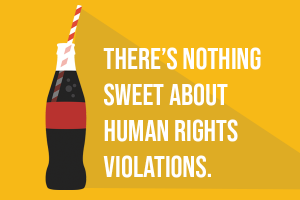(Bangkok) – A Thai court has accepted a landmark lawsuit filed by plaintiffs representing a class of over 700 Cambodian farming families accusing Asia’s largest sugar producer of grabbing their land and destroying their livelihoods. In line with Thai legal procedure, the judges have asked the plaintiffs and the defendant, the Thai sugar giant Mitr Phol, to attempt mediation on September 6. If mediation fails, litigation will proceed.
The complaint, filed in March of this year, accuses Mitr Phol of forcibly displacing the families in rural northwestern Cambodia between 2008 and 2009 to clear the way for an industrial sugarcane plantation – an agriculture project that ultimately failed. In all, Mitr Phol’s subsidiaries, including Angkor Sugar Company, appropriated some 9,430 hectares of land and community-managed forests from 26 villages, leaving residents deeply impoverished to this day. The complaint is the first ever class-action lawsuit filed in the Thai courts by foreign plaintiffs for abuses committed by a Thai company overseas.
Mitr Phol supplies sugar to some of the world’s largest consumer brands, including Nestle, Coca-Cola, Pepsi and Mars. All four are members of Bonsucro, the sugar industry’s sustainability certification body, as is Mitr Phol. Coca-Cola and Pepsi have declared “zero tolerance” for land grabbing in their supply chains.
In response to the lawsuit, Nestle said in a statement that it was “concerned by the allegations and continue[s] to follow developments.” Mars takes the situation “seriously,” the candy maker said in an email to Inclusive Development International, a U.S human rights organization assisting the plaintiffs. Despite its public commitment against land grabbing, Coca-Cola has ignored four letters from the organization urging it to apply its land rights policy to Mitr Phol, one of its top global suppliers.
As the two sides prepare for mediation, the plaintiffs are calling on Mitr Phol’s buyers to use their leverage to ensure that the company provides redress for the harms and human rights violations it caused, as called for under international frameworks such as the UN Guiding Principles on Business and Human Rights and the OECD Guidelines on Multinational Enterprises.
“A decade ago, Mitr Phol destroyed my home and grabbed my farmland,” said one of the plaintiffs, who asked to remain anonymous due to security concerns. “After years of being ignored, I will finally be able to sit across the table from Mitr Phol and make my demands heard. I urge Nestle, Coca-Cola, Pepsi and Mars to do everything in their power to ensure that Mitr Phol takes this process seriously.”
In 2015, the National Human Rights Commission of Thailand found that Mitr Pohl had “direct responsibility” for the harms caused in Cambodia and recommended that it pay compensation to the victims. In May of 2017, the cabinet of Thai Prime Minister Prayuth Chan Ocha officially recognized those findings.
“Mitr Phol has profited from the tears of my community, from our suffering,” said another displaced villager, who also requested anonymity. “The company must provide compensation for the livelihoods that they have destroyed.”
“The reputations of Nestle, Coca-Cola, Pepsi and Mars are on the line in this case,” said David Pred, Executive Director of Inclusive Development International. “The Cambodian victims have been waiting for justice for a decade – if Mitr Phol doesn’t deliver it through these mediations, the brands should immediately cut their supply contracts with the company. Failing to do so after so many years would render their commitments to responsible sourcing utterly meaningless,” he added.
The lawyers representing the plaintiffs are among Thailand’s most experienced class-action and environmental litigators. Somchai Armeen, director of Legal Rights and Environmental Protection Advocacy, is counsel in seven of the eight class-action lawsuits currently underway in the Thai courts. Sor Rattanamanee Polkla, of the Community Resource Centre Foundation Coordinator, has represented communities in nearly 100 cases involving environmental damage.
The human rights organizations Inclusive Development International and Equitable Cambodia have supported the families in filing the complaint, as well as a separate complaint to Bonsucro.
More details about the case are available here:
For a video telling the story of the forced evictions, see:


